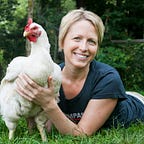Big Ag’s Cruelty Began Long Before Coronavirus
It’s no secret that the massive slaughterhouses killing and processing meat in the US force animals to endure cruel, inhumane treatment. Now, the pandemic is exposing yet another ugly truth of factory farming: Despite being hotbeds for COVID-19 outbreaks, profit-driven slaughterhouses continue to recklessly operate at the expense of low-income workers and, by extension, their families and communities.
Some industry leaders and government officials have even shamefully gone so far as to blame the workers themselves for these outbreaks.
Forced to make the impossible choice between protecting their health and providing for their families, the majority of these scapegoated workers continue to show up. And as an already-dangerous industry turns deadlier for animals and workers alike, the Trump administration has ordered plants to remain open. This not only begs the question if having meat on our plates is more essential than the health of the workers, but if meat is actually essential at all.
“Does it make sense to have meat in the markets if it takes the blood of the people who are dying to make it every day?” asked Menbere Tsegay, a worker at the Smithfield Foods plant in South Dakota, where more than 800 workers have confirmed cases of COVID-19.
Amid coronavirus concerns, slaughterhouses are quick to claim that they are doing all they can to protect workers, but worker testimonies and undercover investigations have proved time and time again that slaughterhouses’ concerns lie with the bottom line, not the people who labor for it or the animals who die for it. We know these sad realities because we are among the few outsiders who have penetrated the veil of this hidden system of filth and violence.
A recent outbreak on Maryland’s vulnerable Eastern Shore occurred at Amick Farms, a plant notorious for its poor treatment of workers and animals. Undercover footage of the farm obtained in our 2018 investigation revealed that the plant was allowed to operate at increased line speeds with little to no increased oversight at huge expense to both the birds being slaughtered and the workers themselves. As workers struggled to keep up with the quickly moving lines, mistakes went unnoticed, often leading to atrocities such as still-conscious animals being dragged through tanks of scalding hot water, lines regularly breaking down with animals trapped in electrified water to drown, and workers suffering from injuries like carpal tunnel syndrome as a result of fast, repetitive motions.
In April, Amick Farms was selling face masks rather than providing them to employees, workers reported. Our undercover investigator (speaking anonymously for safety purposes) confirms that any additional PPE a worker might request after what they are given for their position must be purchased at the facility’s supply store, the cost of which would be deducted from their paycheck.
Meanwhile, in pig slaughter plants, a new Trump administration rule has begun speeding up slaughter lines while simultaneously reducing USDA oversight and shifting critical food safety and humane handling responsibilities to the plants. The program moved forward despite a report claiming that plants under the high-speed testing program “have repeatedly violated the same [food safety] regulations with little or no consequence.”
Even amidst coronavirus outbreaks, plants continue to request and receive these high-speed slaughter waivers allowing them to kill more and more animals every hour. For instance, since March of this year, FSIS has granted at least 16 waivers to chicken slaughter plants, allowing them to speed up pace at which animals are already rapidly forced through the kill lines. This means that workers in positions like “live hang” standing shoulder-to-shoulder might be pressured to move even faster rather than slow down and spread out to observe social distancing. This is to say nothing of the increased rate of injuries to workers and millions more chickens killed annually, continuing this cycle of ever-increasing exploitation.
Here’s the bottom line: Slaughter plants aren’t necessary for feeding America. They are leeching off of underpaid workers and consumer dollars on the backs of innocent animals, all the while warning against a U.S. meat shortage yet exporting pork and poultry to China. We have long since passed the time to reform this broken system. The time has come to dismantle it. The meat industry has made clear that it isn’t willing to take responsibility for its contribution to the spread of this deadly virus, its marginalization of underpaid workers, the environmental devastation to communities, or its cruel and barbaric treatment of animals.
Alarmingly, the U.S. government has bankrolled this cruelty for decades. It’s time to cut the cord and let these mega-corporations built on exploitation sink or swim. If conscious consumers withdraw their support by changing their diets, someday we may all be able to sleep more soundly knowing that no one — human worker or non-human animal — died for our dinner.
